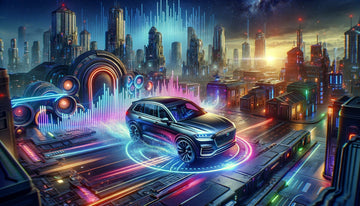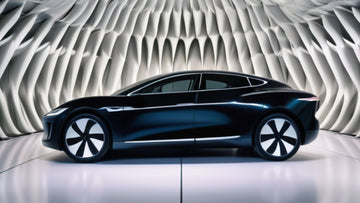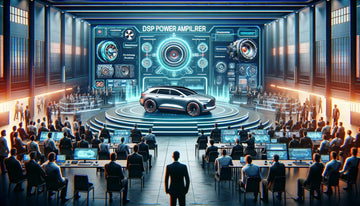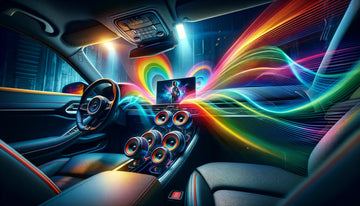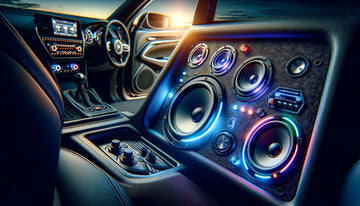What is a DSP, and Why Should You Have One in Your Car?
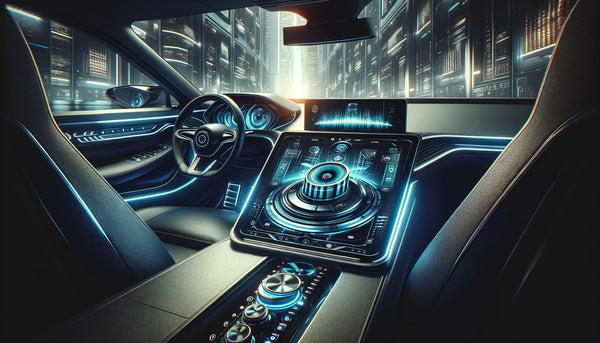
You've meticulously selected the latest car speakers and a potent amplifier, envisioning an unparalleled audio voyage in your vehicle—it's an audiophile's dream. However, there's a lingering sense that the sonic landscape isn't as rich or detailed as you envisioned. Enter the realm of Digital Signal Processing (DSP). While many enthusiasts pour their investments into state-of-the-art speakers and amplifiers, the true transformation of your car audio system's sound quality often lies within DSPs. But what exactly does a DSP do in car audio, and what makes it an indispensable addition to your car's stereo setup? Let's uncover the essence and benefits of incorporating a DSP into your audio system.
What is a DSP?

A Digital Signal Processor, or DSP, is more than just a piece of hardware; it's a pivotal innovation, at times complemented by software, crafted to elevate and refine the sound quality emitted by your car's audio setup. It empowers you with granular control over many sonic parameters, such as precise equalization to tailor the audio spectrum, signal delay to synchronize sound across various car speakers, and intricate crossover settings to ensure each speaker operates within its optimal frequency range. This level of control transforms your car into a concert hall on wheels, where every note and beat is rendered with clarity and depth.
Types of Functions in a DSP
In the intricate world of DSPs, various functions come into play to sculpt the perfect auditory experience within your vehicle.
Equalization: This feature allows you to customize the sound spectrum to your preference, enhancing bass frequencies, midranges, or high frequencies, depending on your taste. Whether you crave a deep, resonant bass or crisp, clear highs, equalization provides the tools to shape your audio landscape.
Signal Delay: Also known as time alignment, this function meticulously synchronizes audio output from different distances, ensuring that sound waves from all car speakers converge at your ears in perfect harmony. This meticulous alignment eradicates any dissonance, creating a unified auditory field that envelops you in sound.
Crossover Settings: This critical function delineates the sonic territories, directing specific frequencies to the right speakers or subwoofers. Each component thrives in its optimal frequency range by confining bass to subwoofers and higher tones to tweeters, contributing to a balanced and dynamic soundstage.
Soundstage Enhancement: This aspect of DSP technology transforms the acoustic environment of your car, making the music seem as though it's emanating from the stage in front of you rather than being confined to the sides. This strategic positioning of sound enriches the listening experience, offering a vivid sense of each instrument's location and movement.
Through these sophisticated DSP functions, your car becomes more than just a mode of transportation; it becomes a sanctuary of sound, where a concert-like audio experience accompanies every journey.
Why Do You Need One?
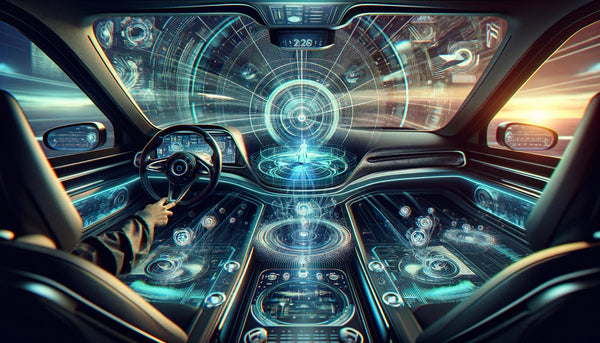
The question of why you might need a DSP in your car audio system finds its answer in the pursuit of audio perfection. A DSP isn't just an accessory; it's a transformative element that caters to the nuanced demands of sound quality enthusiasts and casual listeners.
Firstly, the sheer precision and customization offered by a DSP are unparalleled. Whether aiming to achieve a balanced soundstage that mirrors a live concert environment or fine-tune each frequency to suit your personal taste, a DSP provides the tools to make these adjustments with surgical accuracy. It's about taking control of your audio experience, ensuring that each note and beat is presented in its best possible form.
Moreover, the diversity of car interiors and speaker placements often results in uneven sound distribution and quality. A DSP addresses these challenges head-on, employing algorithms and adjustments like signal delay and equalization to compensate for acoustic imperfections. This ensures a harmonized audio experience, regardless of the vehicle's layout or the listener's position.
Additionally, integrating a DSP can significantly enhance the performance of existing car audio components. By optimizing each speaker's output and ensuring they operate within their ideal frequency ranges, a DSP can breathe new life into even the most basic car stereo setups, elevating the overall audio quality without the need for expensive hardware upgrades.
Lastly, the advent of digital music and streaming services has changed how we consume audio, often at the expense of sound fidelity. A DSP can counteract this by refining and restoring the audio signal, ensuring that your digital music collection is enjoyed in the highest quality possible, free from the constraints of compression and digital artifacts.
A DSP is the heart of a high-fidelity car audio system, crucial for anyone who values depth, clarity, and precision in their listening experience.
Optimal Audio Precision
Installing premium speakers and amplifiers is a significant step towards superior audio quality in your vehicle, but it doesn't guarantee the pinnacle of sound excellence. This is where the role of a DSP becomes indispensable. It offers the capability for micro-adjustment of audio settings, allowing you to extract the fullest potential from your car audio system.
With a DSP, you can fine-tune every aspect of the sound output, from tweaking the tone controls to adjusting the balance and enhancing the clarity of different frequencies. This level of control ensures that regardless of the music genre or audio content, your system is calibrated to deliver the best possible listening experience, making a DSP an essential tool for achieving audio perfection in your car.
Enhanced Speaker Efficiency
With precise configuration of crossover points and signal delay, a DSP empowers you to maximize the efficiency of every speaker in your system. This optimization ensures that each speaker operates within its ideal frequency range, significantly minimizing distortion and elevating the overall clarity of the sound. This careful calibration enhances individual speakers' performance and contributes to a more cohesive and immersive audio experience. By fine-tuning these parameters, a DSP ensures that your car audio system works in perfect harmony, delivering sound that is both rich in detail and beautifully balanced.
Personalized Listening Experience
A DSP stands as the gateway to a personalized audio realm, granting you the autonomy to sculpt the sound to your exact preferences. It doesn't matter if your preference leans towards a robust bass foundation or the pristine clarity of vocals; with a DSP, the power to mold the audio landscape to your liking is at your fingertips. This customization extends beyond mere bass and treble adjustments, allowing for intricate modifications across the entire audio spectrum. Whether it's a subtle enhancement of mid-range tones to bring out the warmth in music or fine-tuning high frequencies for detailed sound textures, a DSP ensures your car audio system resonates with your personal auditory preferences, making every drive a bespoke listening experience.
Enhanced Acoustic Environment
Vehicles' inherent design and materials often present acoustic challenges, not ideally suited for pristine sound reproduction. Factors like the car's unique shape, diverse materials used in the interior, and ambient road noise can significantly affect the audio quality. A DSP mitigates these issues, employing advanced algorithms and acoustic corrections to counteract the less-than-ideal conditions. By adjusting for these environmental factors, a DSP can vastly improve the clarity and immersion of the sound, transforming your car into an oasis of audio perfection amidst the hustle and bustle of the road. This ability to adapt and correct the acoustics ensures that your listening experience remains uncompromised, delivering a sound that is both pure and enveloping.
System Scalability and Adaptability
Incorporating a DSP into your car's audio setup enhances your current listening experience and secures your system's relevance for the future. As your audio aspirations evolve—be it through the addition of new speakers, a more powerful subwoofer, or other enhancements—a DSP facilitates effortless reconfiguration and recalibration of your setup. This adaptability ensures that your audio system maintains its exceptional performance with every upgrade, seamlessly integrating new components and optimizing them to work in harmony with your existing setup. A DSP, therefore, acts as a cornerstone for an audio system that grows with your needs, always delivering a top-tier auditory experience that is both flexible and forward-thinking.
What is DSP in car audio?
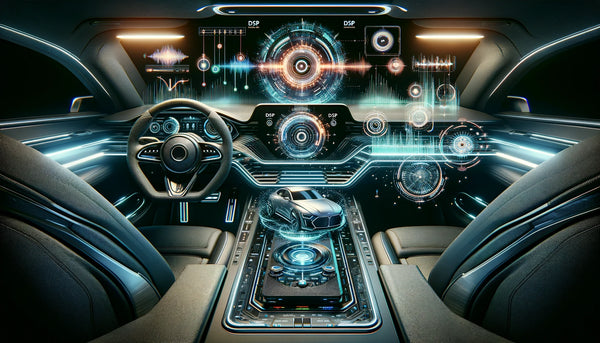
In car audio, a Digital Signal Processor (DSP) is an advanced electronic device designed to optimize and enhance the sound quality of your car's audio system. It works by digitally processing the audio signals that pass through it, allowing for precise control over various aspects of the sound, such as equalization, crossover filtering, time alignment, and more. A DSP can adjust the audio to compensate for the acoustics of the car's interior, balance sound across different speakers, and tailor the sound to the listener's preferences, leading to a more immersive and high-fidelity listening experience.
Do I need a DSP?
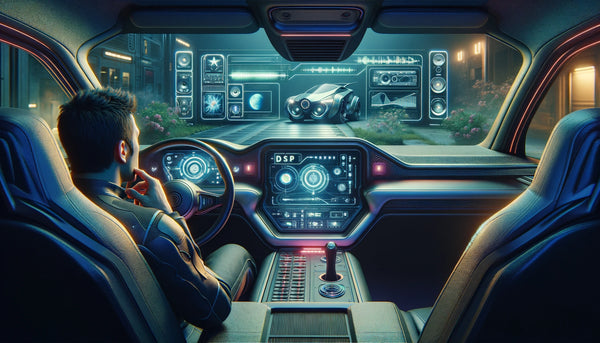
Deciding whether you need a DSP (Digital Signal Processor) in your car audio system involves considering several factors, including your audio quality expectations, the complexity of your current setup, and your desire for customization.
- Audio Quality Enhancement: If you want to significantly improve your car audio's frequency response and overall sound quality, a DSP can offer advanced equalization capabilities. This allows for precise adjustments to different frequency bands, ensuring your music sounds clear, balanced, and free from distortion, which is often a limitation with traditional car audio systems.
- Integration with Modern Devices: For those who frequently use Bluetooth connectivity to stream music from a smartphone, a DSP can offer improved sound processing capabilities compared to a standard head unit. A DSP can include advanced DACs (Digital-to-Analog Converters) and ADCs (Analog-to-Digital Converters), ensuring high-quality audio reproduction from digital sources.
- System Complexity and Components: If your setup includes components from high-end brands like Rockford Fosgate, Audison, or Kicker and involves multiple amps, enclosures, and rear speakers, a DSP can help manage and optimize the output of each component. This ensures that amplification is precisely controlled and each speaker is utilized to its full potential without overwhelming specific frequencies or creating an unbalanced soundstage.
- Customization and Control: A DSP system allows for customization not typically available in more traditional setups. With features like time alignment and specific frequency crossovers, you can tailor the sound output to the unique acoustics of your vehicle and your personal listening preferences. This is especially beneficial if you enjoy tweaking settings like the balance between your front and rear speakers or if you want to use an equalizer to adjust specific aspects of your music.
- Cost Consideration: While adding a DSP can enhance your audio experience, it's also essential to consider the cost. DSPs can range from relatively affordable to quite expensive, depending on the brand (e.g., Audison, Rockford Fosgate) and specific features offered. It's essential to weigh the benefits against the investment to determine if a DSP aligns with your budget and audio quality goals.
- Future-Proofing: A DSP provides a scalable solution that can adapt to new technologies and components for audiophiles looking to future-proof their system. Whether you upgrade your headphones, add new car amplifiers, or switch to different audio sources, a DSP can accommodate these changes, ensuring your system remains up-to-date and performs optimally.
In summary, if you're passionate about achieving the best possible sound quality in your car, value the ability to customize your audio experience, and are willing to invest in technology that can grow with your system, a DSP could be a valuable addition to your car audio setup.
How does a DSP improve the frequency response of car audio systems?
A Digital Signal Processor (DSP) serves as a master sculptor of sound within your car audio system, meticulously shaping the frequency response to achieve a harmonious balance across the audio spectrum. Unlike traditional car audio systems, a DSP offers granular control over individual frequencies, which may have fixed or limited equalization settings. This means you can boost or attenuate specific frequency bands to compensate for acoustic anomalies inherent in a car's interior, such as overemphasized bass or muffled high frequencies. The result is a cleaner, more defined sound that accurately reproduces the intricacies of your music, from the deep resonance of a bass guitar to the crisp clarity of cymbal crashes, ensuring an immersive listening experience that is both rich and distortion-free.
Can a DSP integrate seamlessly with factory-installed head units?
Integrating a DSP with a factory-installed head unit can transform an average car audio system into an extraordinary one. Modern DSPs are designed with flexibility, allowing them to work in tandem with the existing head unit, whether an essential stereo or a more advanced system with built-in Bluetooth and smartphone connectivity. This seamless integration is facilitated by advanced interfaces and software that can interpret the head unit's output, process the audio signal through sophisticated algorithms, and then send a refined signal to the amps and speakers. The DSP acts as an intermediary, enhancing sound quality without needing to replace the head unit. It is a versatile solution for audiophiles looking to upgrade their system's performance while maintaining their vehicle's interior's original aesthetics and functionalities.
Is a DSP a cost-effective upgrade for enhancing car audio quality?
When considering upgrades to enhance car audio quality, a DSP stands out as a particularly cost-effective solution, especially compared to completely overhauling your audio system with new speakers, amplifiers, and possibly a new head unit. While the initial investment in a DSP might seem significant, its versatility and range of improvements—from precise equalization and time alignment to advanced crossover settings and soundstage enhancement—provide a substantial return on investment. A DSP can breathe new life into your existing components, making even entry-level speakers perform at their best by ensuring they receive a perfectly tailored audio signal. Moreover, the ability to fine-tune your audio settings means that you can achieve your desired sound quality without needing further expensive hardware upgrades, making a DSP an economically sound choice for audiophiles and casual listeners seeking to maximize their car audio system's potential.
Summarizing the sonic journey

To encapsulate, a Digital Signal Processor (DSP) might be the pivotal element that bridges the gap between your premium audio components and the extraordinary sonic experience you seek. It stands out by providing unmatched control and personalization over your sound, positioning itself as an essential component of any discerning car audio enthusiast's setup. Whether you aim to refine the acoustics, tailor the sound to your taste, or future-proof your audio system for upcoming enhancements, a DSP holds the key to elevating your in-car audio journey from the realm of the ordinary to the extraordinary. Embark on a journey of safe driving complemented by exceptional auditory pleasure with a DSP at the heart of your car's audio system.

